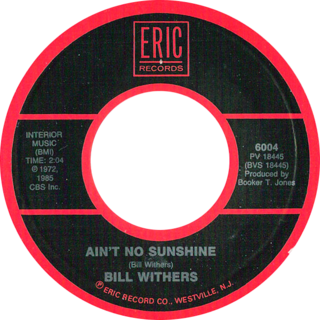
"Ain't No Sunshine" is a song by Bill Withers, from his 1971 debut album Just As I Am, produced by Booker T. Jones. The record featured musicians Donald "Duck" Dunn on bass guitar, Al Jackson Jr. on drums and Stephen Stills on guitar. String arrangements were done by Booker T. Jones. The song was recorded in Los Angeles, with overdubs in Memphis by engineer Terry Manning.

"Forget Me Nots" is a 1982 song by the American R&B musician Patrice Rushen. It appears on her seventh album, Straight from the Heart. It has been sampled and interpolated in several songs, including "Men in Black" (1997) by Will Smith and "Fastlove" (1996) by George Michael.

"After the Love Has Gone" is a song by Earth, Wind & Fire, released in 1979 as the second single from their ninth studio album I Am on ARC/Columbia Records. The song reached No. 2 on both the US Billboard Hot 100 and the Billboard Hot R&B Singles chart, No. 3 on the Billboard Adult Contemporary chart, and No. 4 on the UK Singles Chart. "After the Love Has Gone" was certified gold in the US by the RIAA and silver in the UK by the BPI.
Brian Alexander Robertson is a Scottish musician, composer and songwriter. He had a string of hits in the late 1970s and early 1980s characterised by catchy pop tunes and jaunty humorous lyrics, including "Kool in the Kaftan", Knocked It Off", "To Be or Not to Be" and "Bang Bang", a tongue-in-cheek commentary on famous historical and fictional couples. He wrote with Mike Rutherford of Genesis the Grammy-nominated and Ivor Novello Award-winning "The Living Years". It was a number one hit in the US, Canada, Australia and Ireland and reached number 2 in his native UK. He has also written music for films and been a television presenter.

"Message in a Bottle" is a song by British rock band the Police. It was released as the lead single from their second studio album, Reggatta de Blanc (1979). Written by the band's lead singer and bassist Sting, the song is ostensibly about a story of a castaway on an island who sends out a message in a bottle to seek love. Having received no response for a year, he despairs, believing that he is destined to be alone. The next day, however, he sees "a hundred billion bottles" on the shore and realizes that there are more lonely people like him.
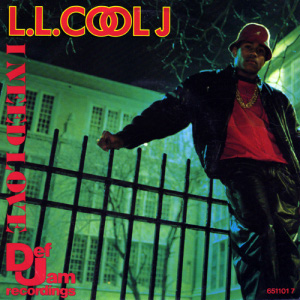
"I Need Love" is the second single from LL Cool J's second album, Bigger and Deffer. The single reached number 1 on the Hot Black Singles and number 14 on the Billboard Hot 100 while becoming one of the first rap songs to enjoy mainstream popularity in the UK, rising to number 8 in the UK Singles Chart. The single won a Soul Train Music Award for Best Rap Single in 1988 Soul Train Music Awards. The song was listed as number 13 on About.com's Top 100 Rap Songs.

"Woo-Hah!! Got You All in Check" is a song by American rapper Busta Rhymes. It was released on January 7, 1996, by Flipmode Entertainment and Elektra Records as his debut solo single and the lead single from his debut studio album, The Coming (1996). The song was both written and produced by Rhymes and Rashad Smith. It contains additional vocals by Flipmode Squad member and Rhymes' cousin Rampage, credited as Rampage the Last Boy Scout. A critical and commercial success, the song peaked at number 8 on the US Billboard Hot 100, and also peaked at the same position in the United Kingdom and New Zealand. In the United States, the song was released with several remixes of the song and the song "Everything Remains Raw", also appearing on The Coming, as its B-side. The single received a nomination for Best Rap Solo Performance at the 39th Grammy Awards, losing to "Hey Lover" by LL Cool J. In addition, its music video received a nomination for Breakthrough Video at the 1996 MTV Video Music Awards.
"Arrival" is a 1976 composition by Swedish pop group ABBA featured on their album of the same name. It is an instrumental piece, mainly the brainchild of member Benny Andersson and had the working titles of "Fiol", "Ode to Dalecarlia" and "Arrival in Dalecarlia".
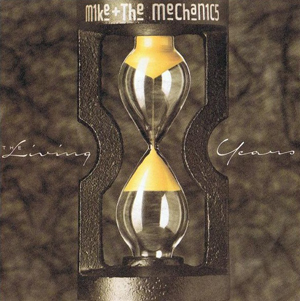
"The Living Years" is a soft rock ballad written by B. A. Robertson and Mike Rutherford, and recorded by Rutherford's British rock band Mike + The Mechanics. It was released in December 1988 in the United Kingdom and in the United States as the second single from their album Living Years. The song was a chart hit around the world, topping the US Billboard Hot 100 on 25 March 1989, the band's only number one and last top ten hit on that chart, and reaching number-one in Australia, Canada and Ireland and number 2 in the UK. It spent four weeks at number-one on the US Billboard Adult Contemporary chart. Paul Carrack sings lead vocals on the track.
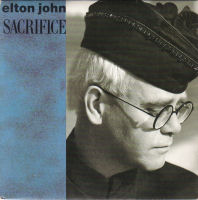
"Sacrifice" is a song by British musician Elton John, written by John and Bernie Taupin, from John's 22nd studio album, Sleeping with the Past (1989). It was first released in October 1989 as the second single from the album. It achieved success in 1990, particularly in France and the United Kingdom, becoming John's first solo chart-topper in both nations. The song describes how hard it is to stay faithful and devoted in a marriage, challenging the mantra that a successful union requires sacrifice. Due to the song's success, John has played this song in various locations in the years since it was released.

"Hands Off...She's Mine" is the second single by British ska/new wave band the Beat, released on 14 February 1980 as the first single from their debut album I Just Can't Stop It. The single was successful, peaking at number 9 on the UK Singles Chart.
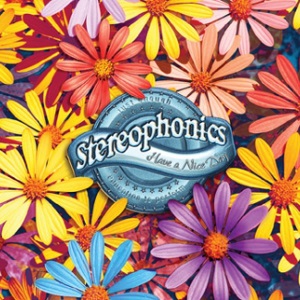
"Have a Nice Day" is the second single from rock band the Stereophonics taken from their third album Just Enough Education to Perform (2001). Written by Kelly Jones and produced by Bird and Bush, it was released on 11 June 2001. The song received negative reviews but reached number five on the UK Singles Chart and went on to become one of the band's biggest hits. It also found success worldwide, reaching number 11 in Ireland, number 37 in New Zealand, and number 26 on the US Billboard Adult Top 40, becoming Stereophonics' first song to chart in the United States.

"Everybody's Got to Learn Sometime" is a 1980 single written by James Warren and first performed by British pop band the Korgis, with Warren as the lead singer. It has subsequently been covered by numerous other artists.
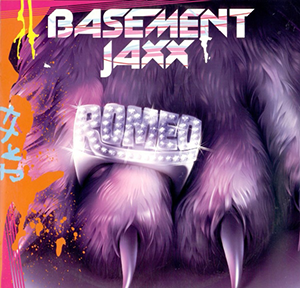
"Romeo" is a song by English electronic music duo Basement Jaxx, released as the first single from their second studio album, Rooty (2001). British R&B singer Kele Le Roc provides the track's lead vocals while Corryne Dwyer sings the background vocals. The song was released on 4 June 2001 as the first single from the studio album.

"Dreamin'" is a song recorded by Cliff Richard from his 1980 album, I'm No Hero. The track was the first of three singles released and was the biggest hit from the album, becoming a top-ten hit in numerous countries including the UK and the US where it became his third and last top ten hit.

"Carrie" is a song performed by Cliff Richard and released in December 1979 as the third single lifted from Richard's album Rock 'n' Roll Juvenile. It reached number 4 in the UK Singles Chart and became an international hit.

"I Surrender" is a song written by former Argent guitarist and singer Russ Ballard and first released by Head East as a single in October 1980 from their sixth album U.S. 1. It is better known for being a hit for Rainbow the following year, reaching number 3 on the UK Singles Charts.

Initial Success is the third studio album by Scottish musician BA Robertson, released on 7 March 1980 by Asylum Records. The album peaked at number 32 on the UK Albums Chart and several singles were released, including the top 10 hits "Bang Bang", "Knocked It Off" and "To Be or Not to Be". The album was reissued on CD on 12 May 2017 by Cherry Red Records and includes several of the singles' B-sides as well as songs performed live at the 2004 Edinburgh Fringe Festival.
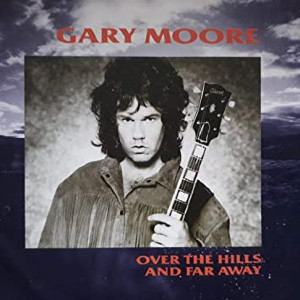
"Over the Hills and Far Away" is a song by Northern Irish musician Gary Moore, released in December 1986 by 10 Records as the first single from his sixth solo album Wild Frontier. The song peaked at number 20 on the UK Singles Chart, but was most successful in the Nordic countries, topping the charts in Finland and Norway.

"Knocked It Off" is a song by Scottish musician BA Robertson, released in October 1979 as the third single from his debut album Initial Success. It became his second Top-Ten hit in the UK, peaking at number 8 on the Singles Chart. The song features a sarangi by Neil Sorrell. The title "Knocked It Off" means, in this context, to become a success somewhat unexpectedly. The lyrics criticise celebrity life, making references to pop and football fame.


















